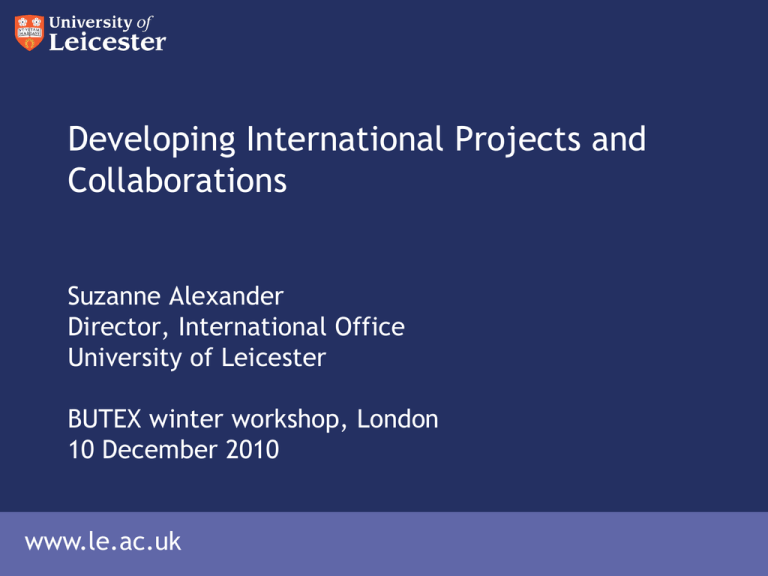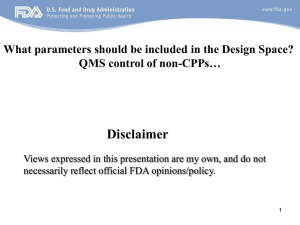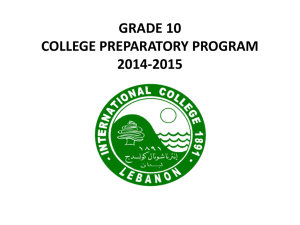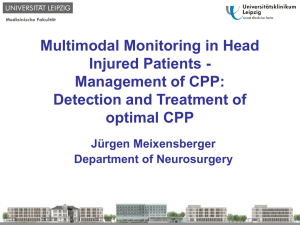Developing International Projects and Collaborations
advertisement

Developing International Projects and Collaborations Suzanne Alexander Director, International Office University of Leicester BUTEX winter workshop, London 10 December 2010 www.le.ac.uk Overview and objectives • To consider institutional objectives for collaborative projects and partnerships and their place in international activity/strategies • To explore different approaches to successful collaborative project management and organisation What can collaborative projects and partnerships (CPP) do for us? • Internationalisation: Diversification of student body Opportunities for student mobility Opportunities for staff mobility Curriculum and programme development Potential for research collaboration Access to new networks • Reputation, profile and positioning • Economic drivers: Changing structure of international education market and global student mobility trends Access to new initiatives, funding opportunities Collaborative activities Collaborative projects and partnerships may include: • Student mobility and exchange • Staff mobility, exchange and development • Course development eg joint courses, dual degrees • Course delivery eg articulation, franchising, twinning, distance learning, transnational education (TNE) • Research collaboration (individual, departmental, institutional) • Technical co-operation and development projects (capacity-building) • Other co-operative projects eg summer schools, short courses, student projects, student placements, teaching/language assistants Models for collaborative working • Bilateral • Multilateral • Formal networks or consortia • Informal networks (“circle of friends”) Collaborative projects and partnerships (CPP): myths or reality? • CPP are a good thing • CPP are for the long term • CPP need a clear focus from the beginning • CPP work best with partners who are “like us” CPP are a good thing • Contribution to institutional international strategy and internationalisation objectives • Opportunities for learning from each other, sharing knowledge and experience • Benchmarking BUT we don’t all take advantage of these! CPP are for the long term • Setting up CPP is time-consuming • Partners need time to get to know each other better • Partnerships inevitably evolve over time: there will be internal and external changes, such as: leadership, staffing, funding, institutional strategy CPP need a clear focus from the beginning • Ownership: individual, departmental, institutional? • Objectives stated - and communicated • Scope for development • A sense of realism CPP work best with partners who are “like us” • Identifying partners • Initiate or respond? • The importance of research • Understanding each other’s expectations Group exercise: Villestadt University would like to meet …. The International Partnerships Office at Redbrick University receives a letter from Villestadt University, which is seeking partners • How would you react to this approach? • What are the reasons for your reactions? • What do you think should be included in a “cold call” approach in order to create a positive impression and encourage it to be taken seriously? Group exercise: Villestadt University would like to meet ….(2) The International Partnerships Office receives a letter from Villestadt University, which is seeking to work collaboratively with Redbrick University • Would you react differently to this approach from Villestadt University? • What are the reasons for your reactions? CPP: priorities, options and opportunities What do you (International Office, institution) want from your international collaborations/partnerships? • Develop networks/programmes/expertise in particular countries or regions • Increase: International students Students and/or staff mobility International profile/reputation International collaboration, exchanges, networks • Attract funds for collaborative multinational projects • Provide assistance/expertise in developing countries Assessing institutional capacity and capability: what kind of partner will you be? • Study programmes offered/academic strengths and expertise • Resources/services/facilities • Experience and track record • Leadership and commitment Case example: University link, Pakistan • New University, Government-funded, but aims to be self-financing • Multi-faceted relationship, which has evolved over time • The impact of changing institutional leadership and priorities An evolving relationship 2007 2008 2009 2010 Sponsored PhDs (staff development) x x - - Support for the International Office - x x x Student study tours - x - x Student recruitment (Master’s degrees) - - x x Distance Learning centre ? ? - - Customised staff development courses - - - x Important factors in the relationship • Getting to know each other: two-way visits, building good personal relationships • Ensuring that there are clear benefits for both parties to the Agreement • Creative approach to incentives in the Agreement • Flexibility in responding to changes - every activity will not necessarily succeed or continue • Continuing commitment to the management and development of the relationship Strategic approaches to CPP: Leicester’s strategic partnerships project • Develop and implement a framework to use links and partnerships around the world more strategically, supporting the broader objectives of raising the University’s profile and reputation internationally • Identify opportunities for further development of existing CPP • Assess and prioritise opportunities for new CPP Strategic partnerships project: Intended outcomes and objectives • Creation of a comprehensive and accessible record of worldwide links • Identification of key strategic partnerships (“preferred partners”) for future development • Establishment of guidance and criteria for future partnership selection and/or prioritisation Group discussion Thinking about your institution now, and your objectives/priorities for CPP: • What would you put forward as an example of good practice in collaborative project/partnership management from your institution? • What would you most like to change or improve about the approach to collaborative project/partnership management in your institution? Critical success factors in managing CPP • Appropriate organisational structure for decision-making • Knowing who is responsible for the relationship at all times, and making arrangements for handovers when necessary (continuity) • Clear communication channels • Recognising that a CPP involves a two-(or more!) way relationship • Sharing experience and information • Regular monitoring and review (quality assurance) • Managing and meeting expectations • Clarity about financial arrangements (if appropriate) • Recognising when a CPP is over Group exercise: Breaking up is hard to do … Many institutions are taking a more “strategic” approach to collaborative links. Your office receives a letter from one of your long-standing partner institutions about their review of CPPs • What would be your reaction to such a letter? Is this a good way to try to manage your partnership relationship? • What other approaches could you take? • What are your views on the proposed selection criteria for preferred partners?










